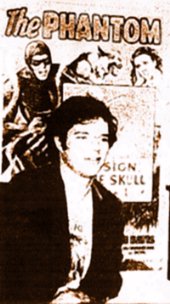Leo Kottke
by Michael Brooks

|
There's a young fingerstyle guitarist on the horizon who is fast becoming known to guitarists through word of mouth and via his latest Capitol release, Mudlark. Thematically similar to John Fahey, including the strong classical orientation, Kottke, who previously recorded an album under Fahey's Takoma label, is a Georgia-born guitarist/vocalist whose musical synthesis has integrated in varying degrees the styles of ragtime, folk, bluegrass, country and western and classical.
Kottke has recently won membership in that small clique of commercially tangent, self-taught guitarists which include Fahey and Cooder. Stylistically from the country directly behind the city, Leo Kottke's musical ideas were shaped form the semi-commercial following of Pete Seeger, clarinetist Jimmy Guiffre, Grant Green, Mitch Greenhill, Fred Gerlach and Burl Ives. His listening background encompasses a wide realm of diverse influences from Bach to Beethoven's "Appassionata," to Buddy Holly.
What makes Kottke significant among the thousands of guitarists starving for fortune today are his 6- and 12-string fingerpicking styles formed from melody lines. His Mudlark LP is an insightfull index of musical ideas, enhanced by a good backup of musicians including bassists like Roy Estrada (ex-Mother's), Larry Taylor (Mayall) and Wayne Moss, along with Mayall drummer Paul Lagos and pianist Jeffrey Kaplan. Four of the cuts were recorded in Wayne Moss's garage in Nashville with Moss on bass, Kenneth Buttrey on drums and John Harris on piano.
Guitar Player interviewed Leo Kottke when he was doing a national concert tour with the Joy of Cooking.
When did you start playing guitar?
About 12 years ago when I was sick. My folks bought me one of those dime-store guitars to fuss with.
Stella? Kay?
Oh, it wasn't even that good. It was the kind of thing you would order from the Sears catalog.
What kind of music were you listening to then?
Burl Ives. You see that was quite a while ago when I was about 13. I started playing a banjo about the same time I started the guitar and that helped my guitar playing quite a bit.
Was it banjo that got you into the guitar?
Peter Seeger and Fred Gerlach [did], I guess. Fred Gerlach, the wood cutter down in Los Angeles, put out a record about 17 years ago on Folkways that's really a fine album. And I used to listen to Seeger's Goofing-Off Suite and Gazette; and I listened to an awful lot of people.
How did you get into their music? Did you start out by copying their styles?
Yeah, I guess I was. I sort of went through what I liked about each one of them.
Did you have lessons or anything?
I had eight years' trombone lessons, but I don't think they could apply.
That probably helped as far as music theory, though.
Is that classical orientation why you and John Fahey hit it off so well?
Yeah, we did hit it off well, but I think he just liked everything that I had sent him. I think he probably appreciated it more at the time than a lot of other people would, because he has always thought of the guitar as a concert instrument, I mean the steel string guitar, not just the classic.
When you first started playing guitar, can you remember anything which helped you develop independence of the fingers?
hat I had to finally do after a while was quit playing with my middle finger and just use my index because, I don't know, but I've always thought because my index is shorter than my middle finger, that I tended to shorten it a little bit. My playing was sloppy until I did that. And you can't be as accurate. Like still, my biggest problem is my index finger, so I am always trying to strengthen it, because it's the one I use to give me enough notes to go outside of the "dead" thumb that I've got going all the time.
Like in strengthening it, have you tried going to a heavier gauge string to help build up the muscles?
Well, I use heavy gauge strings now. It's strong, but it's weak in comparison with the other fingers.